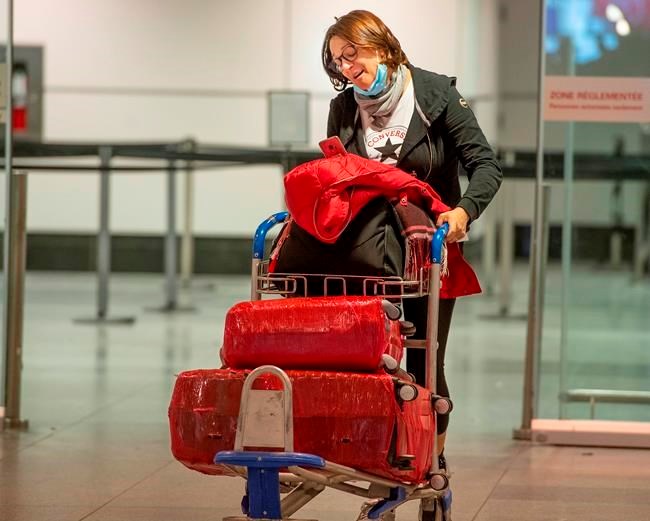MONTREAL — Doris Hamelin and her husband Rejean Vallee said the restaurants in Rome shut down at 6 p.m. Tuesday and the only place they could find food was the grocery store.
In a bid to limit the spread of the novel coronavirus, Hamelin said, Italian authorities have limited the number of people allowed in a business at any given time, so the couple had to wait in line outside, keeping a distance of about a metre apart from the next person.
"It's killing tourism. I'm so sorry for the people over there," Hamelin said Wednesday at the arrival gate of the Montreal-Trudeau International Airport. She and her husband were on the last Air Canada flight between Canada and Italy, the country that has the most cases of the COVID-19 outside China.
Air Canada says it will monitor the progress of the virus and plans to resume service to the country May 1.
Italian Premier Giuseppe Conte said Wednesday night on Facebook Live that Italy must "go another step" by closing all shops and businesses except for food stores, pharmacies and other shops selling essential items.
Many of the travellers who returned from Rome said they would isolate themselves as much as possible for the next 14 days. But they also showed surprise that Canadian authorities didn't take other containment measures with them, other than by handing them a piece of paper.
"You have travelled to an area affected by an outbreak of COVID-19," the document read. For 14 days, the notice said, travellers are asked to monitor their health for fever, cough and difficulty breathing. "If you start having symptoms of COVID-19, isolate yourself from others as quickly as possible. Immediately call a health-care professional."
Hamelin said a customs official asked her and her husband how they were feeling. "I was ready to get my temperature taken and to be tested for whatever." She said she and her husband will do a "voluntary quarantine" for 14 days.
Eighteen-year-old Alex Fleury said he wasn't told anything by airport officials when he got off he plane. He had been to Rome to try out for a soccer team but was sent home and told he could come back and try out when the outbreak was under control.
"I'll probably not go anywhere crowded for the next week or so," he told reporters at the arrival gate.
Ottawa resident Sarah Bardelli said she had her temperature taken at the Rome airport.
She said the situation in Italy is "critical." But despite the extreme situation, Bardelli offered some humour. "It felt like Christmas Day," she chuckled, referring to the empty streets in the capital of the heavily Catholic country. "There was no traffic. No one around."
Conte put his entire country on lockdown Monday to combat the virus, banning all but the most important travel and putting the final kibosh on social gatherings after Italians failed to take previous warnings to heart amid skyrocketing infections.
Two days after imposing the same strict measures on a quarter of the country, the hard-hit north, Conte urged all 60 million Italians to stay home. The only travel allowed will be for proven work reasons, health conditions or other cases of necessity.
At the arrival gate on Wednesday, Mihaela Dajbog pulled her surgical mask down from her face, letting it hang around her neck. Visibly distressed, she talked to a friend on the phone and lamenting how she couldn't do anything to help the country she loves.
"Italy has been kneecapped," she said. "My heart is crying out. You can't do anything for your country."
Most people diagnosed with COVID-19 experience mild or moderate symptoms, such as fever and cough, and the vast majority of those who contract the virus recover.
The Public Health Agency of Canada says the risk to the general population is low. Among the Canadians diagnosed with the illness so far, fewer than 15 per cent have required hospitalization.
— with files from The Associated Press.
This report by The Canadian Press was first published March 11, 2020.
Giuseppe Valiante, The Canadian Press


